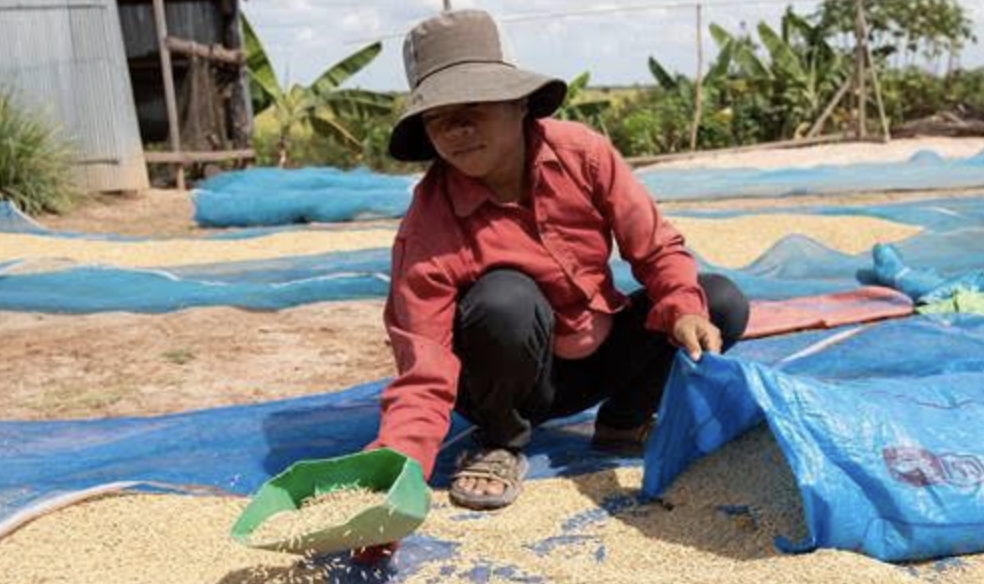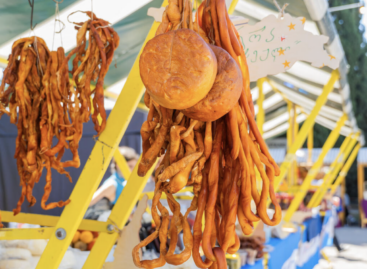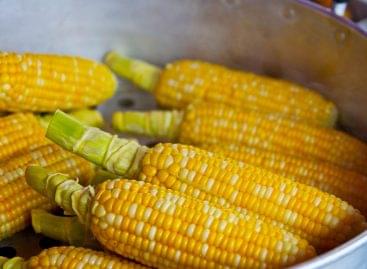FAO Food Price Index drops for the fifth consecutive month in August
The FAO Food Price Index* (FFPI) averaged 138.0 points in August 2022, down 2.7 points (1.9 percent) from July, registering its fifth consecutive monthly decline. Despite the latest drop, the index remained 10.1 points (7.9 percent) above its value a year ago. All the five sub-indices of the FFPI fell moderately in August, with monthly percentage declines ranging from 1.4 percent for cereals to 3.3 percent for vegetable oils.

photo: FAO/Than Rathany
The FAO Cereal Price Index averaged 145.2 points in August, down 2.0 points (1.4 percent) from July, but still 14.8 points (11.4 percent) above its August 2021 value. In August, international wheat prices fell by 5.1 percent, marking the third consecutive monthly decline, driven by improved production prospects, especially in Canada, the United States of America and the Russian Federation, and higher seasonal availability as harvests continued in the northern hemisphere as well as the resumption of exports from the Black Sea ports in Ukraine for the first time in over five months of interruption. Nevertheless, global wheat prices remained 10.6 percent above their values in August last year. International prices of coarse grains increased marginally (+0.2 percent) in August and averaged 12.4 percent above their values a year ago. World maize prices firmed slightly, up 1.5 percent, largely influenced by lower production prospects in the European Union and the United States of America due to hot, dry conditions, while the resumption of exports from Ukraine prevented prices from increasing further. By contrast, global barley and sorghum prices decreased by 3.8 percent and 3.4 percent, respectively. The FAO All Rice Price Index held steady in August, as slight declines in quotations of the most widely traded Indica varieties compensated for mild price gains in other rice market segments.
The FAO Vegetable Oil Price Index averaged 163.3 points in August, down 5.5 points (3.3 percent) month-on-month, pushing the index value slightly below its year-earlier level. The continued decline of the index was driven by lower world prices of palm, sunflower and rapeseed oils, which more than offset higher soyoil quotations. International palm oil prices fell for the fifth consecutive month in August, driven by increasing export availabilities from Indonesia, mainly thanks to lower export taxes, as well as seasonally rising outputs in Southeast Asia. In the meantime, world sunflower oil values declined on lingering subdued global import demand that coincided with the gradual resumption of shipments from Ukraine’s seaports. International quotations for rapeseed oil also dropped in August, due to prospects of ample supplies for the upcoming 2022/23 season. By contrast, world soyoil prices rebounded only moderately, mainly because of concerns over the impact of unfavourable weather conditions on soybean production in the United States of America.
The FAO Dairy Price Index averaged 143.5 points in August, down 3.0 points (2.0 percent) from July, marking the second consecutive monthly decline, but still 27.3 points (23.5 percent) above its value a year ago. In August, international price quotations for butter and milk powders declined, principally due to weaker demand for spot supplies from most leading importers, as inventories remained adequate to cover their immediate needs. Market expectations for increased supplies from New Zealand in the new production season also weighed on international prices, notwithstanding milk production tracking lower in several key producing regions, including Western Europe and the United States of America. By contrast, world cheese prices increased for the tenth consecutive month, reflecting steady global import demand and robust internal sales, especially in European tourist destinations.
The FAO Meat Price Index* averaged 122.7 points in August, down 1.8 points (1.5 percent) from July, also marking the second consecutive monthly decline from an all-time high reached in June 2022, but it remained 9.3 points (8.2 percent) above its corresponding value a year ago. In August, international quotations for poultry meat fell, driven by lower import purchases by leading importers and somewhat elevated global export availabilities. Meanwhile, world bovine meat prices declined on weak domestic demand in some leading exporting countries, raising export supplies, and a modest increase in Australian supplies. By contrast, price quotations for pig meat rose due to the continued low supply of slaughter-ready pigs, while ovine meat prices recovered moderately, owing to increased import demand from some European countries, compensating for lower purchases by China.
The FAO Sugar Price Index averaged 110.4 points in August, down 2.4 points (2.1 percent) from July, marking the fourth consecutive monthly decline and reaching its lowest level since July 2021. The August decline was mainly triggered by an increase in the sugar export cap in India, and lower ethanol prices in Brazil, which raised expectations of a greater use of sugarcane to produce sugar. However, the lower-than-earlier expected sugar production in Brazil in the first half of August due to adverse weather, along with persisting concerns over the impact of dry conditions on the 2022 crop in the European Union, prevented more substantial sugar price declines. The strengthening of the Brazilian real against the United States dollar also contributed to limiting the fall in world sugar prices (expressed in US dollars).
Related news
FAO food price index falls for five months
🎧 Hallgasd a cikket: Lejátszás Szünet Folytatás Leállítás Nyelv: Auto…
Read more >Corn 2026: soil moisture and hybrid choice may decide the season
🎧 Hallgasd a cikket: Lejátszás Szünet Folytatás Leállítás Nyelv: Auto…
Read more >UN: International tourist arrivals up 4% last year
🎧 Hallgasd a cikket: Lejátszás Szünet Folytatás Leállítás Nyelv: Auto…
Read more >Related news
(HU) Átadták a SIRHA Budapest 2026 Innovációs Termékverseny díjait
🎧 Hallgasd a cikket: Lejátszás Szünet Folytatás Leállítás Nyelv: Auto…
Read more >How does the forint exchange rate affect consumer prices?
🎧 Hallgasd a cikket: Lejátszás Szünet Folytatás Leállítás Nyelv: Auto…
Read more >HELL CITY has arrived, led by Michele Morrone
🎧 Hallgasd a cikket: Lejátszás Szünet Folytatás Leállítás Nyelv: Auto…
Read more >









